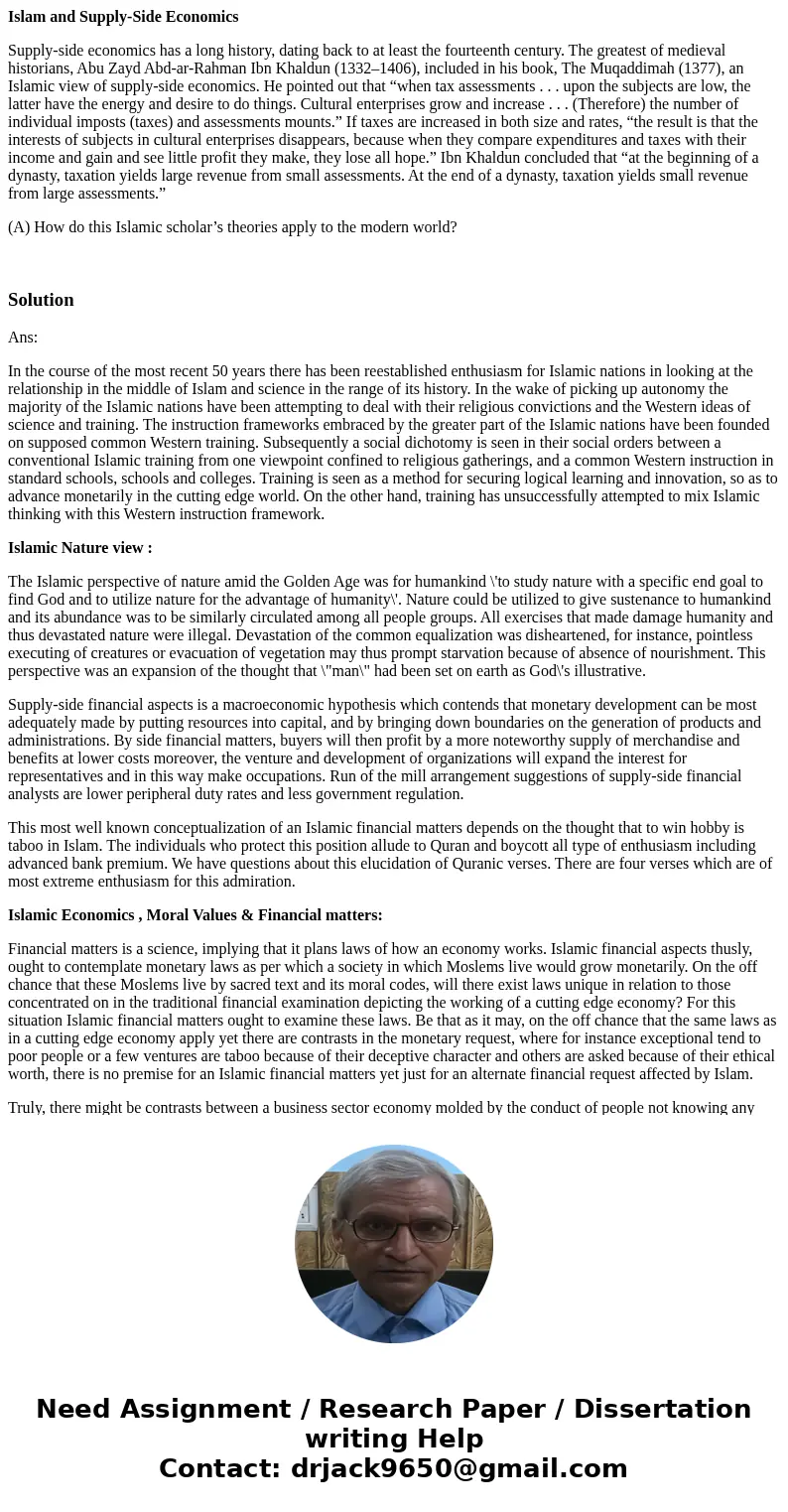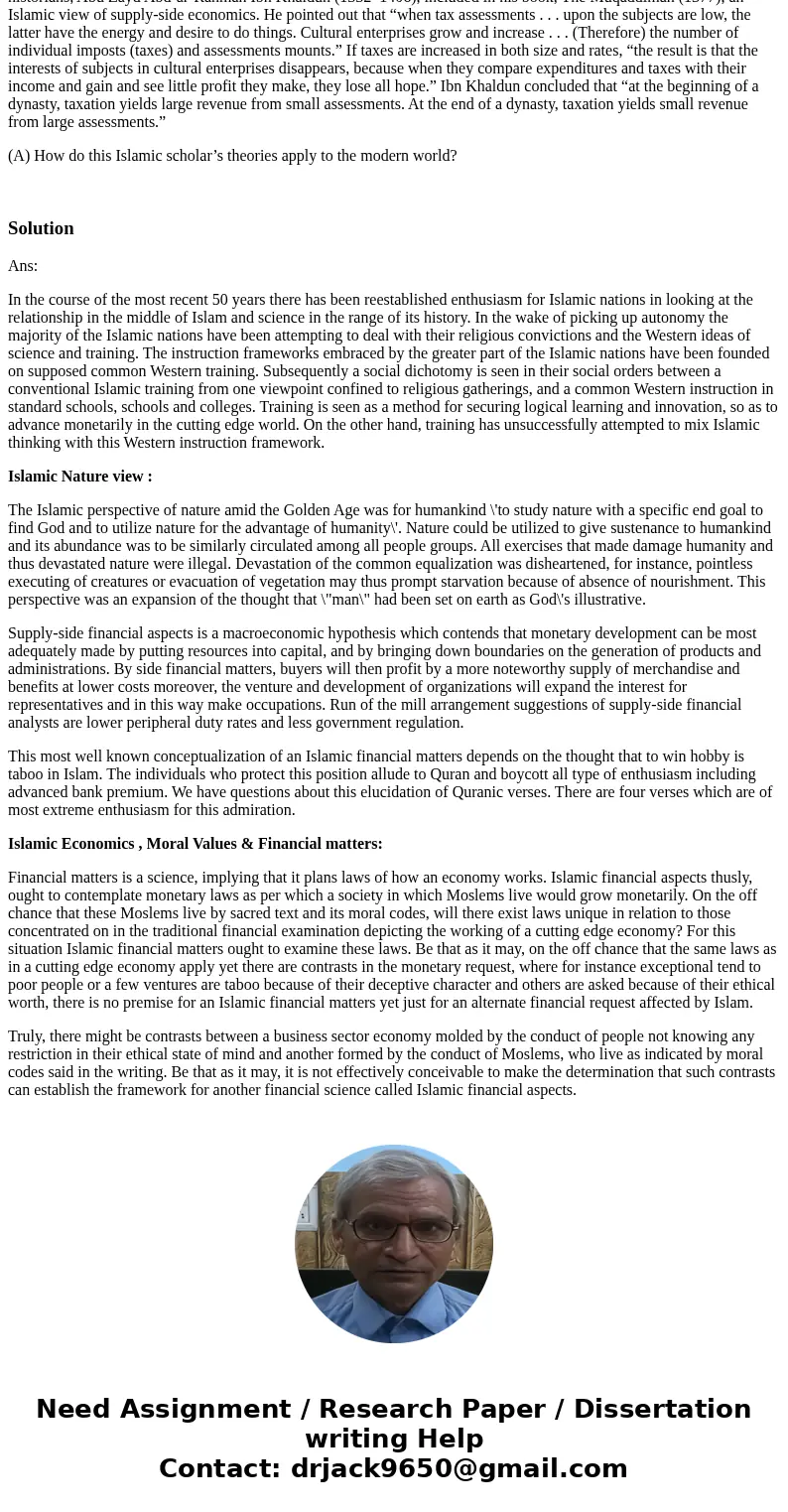Islam and SupplySide Economics Supplyside economics has a lo
Islam and Supply-Side Economics
Supply-side economics has a long history, dating back to at least the fourteenth century. The greatest of medieval historians, Abu Zayd Abd-ar-Rahman Ibn Khaldun (1332–1406), included in his book, The Muqaddimah (1377), an Islamic view of supply-side economics. He pointed out that “when tax assessments . . . upon the subjects are low, the latter have the energy and desire to do things. Cultural enterprises grow and increase . . . (Therefore) the number of individual imposts (taxes) and assessments mounts.” If taxes are increased in both size and rates, “the result is that the interests of subjects in cultural enterprises disappears, because when they compare expenditures and taxes with their income and gain and see little profit they make, they lose all hope.” Ibn Khaldun concluded that “at the beginning of a dynasty, taxation yields large revenue from small assessments. At the end of a dynasty, taxation yields small revenue from large assessments.”
(A) How do this Islamic scholar’s theories apply to the modern world?
Solution
Ans:
In the course of the most recent 50 years there has been reestablished enthusiasm for Islamic nations in looking at the relationship in the middle of Islam and science in the range of its history. In the wake of picking up autonomy the majority of the Islamic nations have been attempting to deal with their religious convictions and the Western ideas of science and training. The instruction frameworks embraced by the greater part of the Islamic nations have been founded on supposed common Western training. Subsequently a social dichotomy is seen in their social orders between a conventional Islamic training from one viewpoint confined to religious gatherings, and a common Western instruction in standard schools, schools and colleges. Training is seen as a method for securing logical learning and innovation, so as to advance monetarily in the cutting edge world. On the other hand, training has unsuccessfully attempted to mix Islamic thinking with this Western instruction framework.
Islamic Nature view :
The Islamic perspective of nature amid the Golden Age was for humankind \'to study nature with a specific end goal to find God and to utilize nature for the advantage of humanity\'. Nature could be utilized to give sustenance to humankind and its abundance was to be similarly circulated among all people groups. All exercises that made damage humanity and thus devastated nature were illegal. Devastation of the common equalization was disheartened, for instance, pointless executing of creatures or evacuation of vegetation may thus prompt starvation because of absence of nourishment. This perspective was an expansion of the thought that \"man\" had been set on earth as God\'s illustrative.
Supply-side financial aspects is a macroeconomic hypothesis which contends that monetary development can be most adequately made by putting resources into capital, and by bringing down boundaries on the generation of products and administrations. By side financial matters, buyers will then profit by a more noteworthy supply of merchandise and benefits at lower costs moreover, the venture and development of organizations will expand the interest for representatives and in this way make occupations. Run of the mill arrangement suggestions of supply-side financial analysts are lower peripheral duty rates and less government regulation.
This most well known conceptualization of an Islamic financial matters depends on the thought that to win hobby is taboo in Islam. The individuals who protect this position allude to Quran and boycott all type of enthusiasm including advanced bank premium. We have questions about this elucidation of Quranic verses. There are four verses which are of most extreme enthusiasm for this admiration.
Islamic Economics , Moral Values & Financial matters:
Financial matters is a science, implying that it plans laws of how an economy works. Islamic financial aspects thusly, ought to contemplate monetary laws as per which a society in which Moslems live would grow monetarily. On the off chance that these Moslems live by sacred text and its moral codes, will there exist laws unique in relation to those concentrated on in the traditional financial examination depicting the working of a cutting edge economy? For this situation Islamic financial matters ought to examine these laws. Be that as it may, on the off chance that the same laws as in a cutting edge economy apply yet there are contrasts in the monetary request, where for instance exceptional tend to poor people or a few ventures are taboo because of their deceptive character and others are asked because of their ethical worth, there is no premise for an Islamic financial matters yet just for an alternate financial request affected by Islam.
Truly, there might be contrasts between a business sector economy molded by the conduct of people not knowing any restriction in their ethical state of mind and another formed by the conduct of Moslems, who live as indicated by moral codes said in the writing. Be that as it may, it is not effectively conceivable to make the determination that such contrasts can establish the framework for another financial science called Islamic financial aspects.


 Homework Sourse
Homework Sourse